An earlier version of this piece previously appeared in New Maps.
Call it paranoia on behalf of an overly online gumshoe, but it would appear there is a new and widespread feeling that we are heading into something for which we are horribly underprepared. Like— the vibes are bad, man. Everyone can get a sense of that much, at least. The paychecks are stretched too thin. Wildfires, floods, and mass shootings have become the norm. A televised genocide is nearing its second year. Pile on the imminent collapse of the Gulf Stream, a staggering rise in homelessness, the hottest goddamn year on record, and a presidential regime that has released ICE as its homegrown gestapo while it strips the copper from any public services that managed to survive decades of neoliberalism. Meanwhile, newly fortified and highly infectious phobias are being injected into the population, turning it further against itself. Outside, the neighbors are cloaking their homes and bumpers in fascist insignia, as if painting their doors in blood against the visiting angel of death.
And yet we rattle onward, staring ahead on the morning commute, en route to the job we may or may not loathe, but which nonetheless shapes our life. Out of sleep-rimmed eyes, through the petroleum fog, we gaze upon hedgerows of burger joints and payday loan establishments, and wonder aghast: What have we done? What in God’s name have we done to our Good Earth? Who is this for? And how long can it persist?
It would be one thing if we were trying and failing, a sort of they know not what they do situation, but to look on the one hand at the resources available, and, on the other, our priorities, it is maddening. Get mad or go mad; either way, it seems there is no viable direction in which to funnel our energy, so we each remain trapped within these hermetically sealed spaces of suffering and spectacle waiting for the end to formally begin, wondering: will there be some kind of starting gun, an announcement, or what?
Dystopian Literature
What might be called The Big Three dystopian novels, the ones most everyone has read at least one of, if they live in the United States and have read anything at all, George Orwell’s 1984, Ray Bradbury’s Fahrenheit 451, and Aldous Huxley’s Brave New World, are each what Ursula K. LeGuin would call Yang dystopias.
In a blog post written in the last few years of her life, LeGuin writes, “Yang is male, bright, dry, hard, active, penetrating. Yin is female, dark, wet, easy, receptive, containing. Yang is control, Yin acceptance. They are great and equal powers; neither can exist alone, and each is always in process of becoming the other.”
In the Big Three Dystopias, and many others, the Yin has been pushed out by an all-controlling Yang state. “Huxley and Orwell [and I would add Bradbury] uncompromisingly present the outcome of successful denial. Through psychological and political control, these dystopias have achieved a nondynamic stasis that allows no change. The balance is immovable: one side up, the other down. Everything is yang forever.”
We all know what Yang Dystopia looks like. It is capitalism’s endless growth. It is military parades, the dictator, the fascist regimes of the twentieth century, a boot stomping on a human face—forever.
But it was stories of Yin Dystopia LeGuin identified as on the rise in 2015. These are the post-apocalyptic tales in which it is not regimes of total control that are to be feared, but rather total loss of control: societal breakdown, zombie hoards, “chaos and old night”. This is the deep fear of a consumer class that has seen the fruits of the postwar economy slowly dry up over the past half-century. Not that they will be dominated, but that they will become superfluous, no longer needed, abandoned like all those industrial workers a generation before. It is the fear that the upper crust of society will simply peel off, like the command module of a rocket ship dropping its boosters as it leaves orbit. The fear that the elite have used capitalism like a massive rocket to propel itself beyond the consequences of its own frantic greed. That they will take the seats of power and the mandate of heaven along with them into some unreachable space, and then, once they are gone, those who helped them achieve this goal for the meager scraps they offered will find themselves amongst those lower classes they had once so comfortably stood atop in order to lick the boots of those overhead, and all the old rules and protections will be gone.
Harrow
Joy Williams has been percolating a horrific beauty out of ecological doom for about five decades now. Her first novel in twenty years, 2021’s Harrow, is an apocalyptic tale told with a few, scant master strokes. It must certainly be a Yin Dystopia and one that feels strangely familiar. Harrow seems to take place in a sort of Purgatory, which we are told early on has been abolished but still exists.
“And one should fear it but one should guard against excessive fear. One mustn’t feel overwhelmed” (4).
Some sort of apocalyptic event has occurred, although we are not treated to its details. It seems to have been ecological, and has led to the breakdown of life-as-it-had-been-known. But any sort of summary of a Joy Williams novel is a dicy expedition, and here I will defer to the professionals. Sam Byers, writing in The Guardian, does a more-than-satisfactory job of encapsulating the major shape of the novel in a single paragraph:
“Harrow is set in an undefined near future in which the global environmental situation has gone from being on ‘the verge that people thought would go on forever’ to all-out catastrophe. Khristen, the novel’s not-quite-central character, briefly died as a baby, or so her mother adamantly believes, and may never have entirely returned. Post-disaster, amid a hallucinatory terrain that may or may not be an afterlife, she finds herself at The Institute, where a loose collective of geriatric terrorists ‘in the worst of health but with kamikaze hearts’ plot suicide missions targeting vivisectionists and pesticide salesmen in the hope that this will ‘refresh, through crackpot violence, a plundered earth.’”
Khristen, nicknamed Lamb by her mother, had been attending a boarding school since her father’s death, but, after the Vague Apocalyptic Occurrence, she embarks on an unsure journey to find a facility on a big lake where she thinks she will be reunited with her mother. She moves as if through a dream, traveling by train, then walking along a wide highway without any traffic. The people she comes across don’t “seem to be traveling. They [are] milling, like little flies after a rain” (37). There is no direction. “Our lives don’t move in a horizontal fashion anymore” (44), Khristen is told.
What is often meant by the end of the world is the end of a given reality structure. Reality structures end all the time. On the macroscale, the genocidal colonization of the Americas meant the end of reality structures on an unprecedented level. On the microscale, gentrification does the same work. Already we inhabit a projection displayed atop a strata of ghostworlds. For those who have lost everything, there may be a feeling of frozenness, but the world at large marches on. Williams excels at weaving this unhappy structural accordance into her work. Often, her characters even manage to grope at the fringes of its meaning, but inevitably fail to grasp it directly, like the assemblage of characters who discuss the works of Goya over a pitcher of bowling alley martinis. One puts it like this: “The important thing to know—no, to realize—is that Saturn, whenever and however depicted, represents Time, which, with its ravenous appetite for life, devours all its creations, whether they are beings, things, ideas, or sentiments” (66).
Saturn Devouring His Son was painted in 1823, so clearly this idea is not anything new. Joan Didion’s essay this series is named in homage to is already over sixty years old, and, even then, she could see that things were falling apart. The Yeats poem she, in turn, was referencing, was, already at the time of her referencing, over four decades old. And he, too, saw the center failing to hold. The prophecy of redemption to which his poem refers lay back beyond another “twenty centuries of stony sleep.”
As people so unhelpfully love to point out, practically every other generation has believed themselves to be living in the end times. The thing is, they have often not been wrong. The apocalypse is an on-going affair, experience of it a matter of geography more than anything else, for it tends to remain localized. Even today, many people have been living in what might popularly be considered periapocalyptic conditions for a long time. Everyone more or less understands this, at some level. We know, and accept, begrudgingly or not, that such is a necessary part of our reality. In fact, it is precisely apocalypse over there that feeds our particular reality over here.
Our food comes from nightmare factories. Child slaves build our phones with raw material stolen from the earth in hellish mines. Amazon workers piss in bottles in order to meet their quota. It goes on and on.
It is the special threat of ecological apocalypse’s containment-breaking abilities with which we are faced today.
Consumer Apocalypse
Khristen eventually does reach Big Girl, a name for the lake which is described as blacker than a crow, and totally silent. This is where The Institute, run by a woman named Lola, has its base, in an old resort situated on Big Girl’s shores. The Institute is occupied by the elderly who intend to reengage with the world not through fatuous good works, but according to the instructions on a piece of paper chosen at random. These slips of paper hold a variety of sacrificial final acts taken against the “very institutions that had made them the last beneficiaries of what was enshrined as progress” (57).
But even this mission has stalled out. The elderly are not so much refusing their missions as putting them off indefinitely. “Some of the papers were worn and torn with handling and seemed destined never to be chosen” (58). The impetus has gone out. The slim, liminal window which opens following all catastrophic events, in which paradigm shifts become possible, seems to be shutting. What is left of the Old Way will limp through even this catastrophe, not through grit and determination, but via sheer momentum. As they say, nothing ever changes; it just get worse:
“There’s the usual useless guidance. Worship is negligible. Art’s decor…Pretty much everything is up and running again. The amusement industry has heroically reestablished itself. Disney World has rebooted and is going strong” (99). Indeed, as one member of the Institute, puts it: “The world seemed to be proceeding as it always had been, it hadn’t ended after all, which was strange too” (108).
How many times have you read, since Trump’s second inauguration, some variation of Revolutionary War nostalgia? We have a way of dealing with tyrants, etc. Comments like this seem to be high up on nearly every story about the wholesale elimination of regulations and public services. If not this, then lamentations about the delayed arrival of the rest of the Mushroom Kingdom, as if thousands of vigilantes are going to pour out of those Avengers portals any minute now to stand behind everyone’s favorite green-clad plumber.
Since the people who leave such comments are often the same type who require a Harry Potter comparison in order to make sense of their own lives, then think of The Prisoner of Azkaban scene in which Harry is waiting for his dad to save him from the dementors, only to realize that it was himself who cast the patronus.
But hey, this ain’t The Institute here. These pieces of paper don’t have to say anything more than, I don’t know, Meet Your Neighbor. Google Mutual Aid Organizations in Your Area. Do Anything Other Than Fucking Posting. And I’m not really talking to any of you anymore. This is aimed at myself.
Hang on now. That sounds like a lot of work. Isn’t there a manager I can speak to who will put things right? I’m being inconvenienced here. I want something comped!
The thing is, for those of us born into a certain socioeconomic strata or higher, Reality has, in the past, had the good manners to keep mostly to itself. Yes, it may crash down out of the heavens like a lightning bolt, scarring the earth with an awesome flash of power every now and again, but we had been under the impression that those were more like slip ups. Like, Reality is a powerful force. Bet. It can’t be expected to be one hundred percent contained one hundred percent of the time. We can accept that it may inconvenience us every once in a while. Heck, it can even kind of spice things up, in moderation, but we were led to believe that those storms were to be sparse and quick. For one to insist on sticking around, settling its full weight across our landscape like a suffocating smog on a windless day? That is too much. There is a certain baseline of comfort that is not to be violated. I cannot find it precisely here in the paperwork, but that was a given. We do not ask for too much, just a safe place in the center, with access to the amenities and comforts we need to put up with the rest, because we will put up with the rest. We will work the jobs we hate. We will sit quietly as the natural world (as it is “still classified, mostly out of laziness”) is plundered. We will scroll past genocide. We will rage against whoever you tell us to rage against, but, c’mon, man, you have got to give to us our daily bread.
Our lives have been predicated upon the understood difference between a polite weatherman reporting the day’s forecast and a sandwich board prophet preaching hellfire. One can be planned around whilst the other is laughed off, but that agreed upon dynamic seems to be falling under distress. The two are now reporting the same message, albeit in greatly differing dialects. Still, that great bulwark we have long trusted to contain the Bad Stuff, to ensure that one kind of pain (namely: starvation, miserable labor conditions, homelessness, bigotry, poverty, etc) be kept, at any cost, on the far side of the barrier, while only another kind of pain (an ashy, vampiric longing for full humanity) be allowed to blight, but never quite ruin, our side of joy and indulgence, seems suddenly to be shifting.
It is no secret that even on this side, things are not on equal footing, and that is fine. That is understood. But speaking for those of us with our stakes set rather nearer this wall, well, it is only natural to ask just how far it plans on moving, and who in charge can we make our appeals to? What would happen if, say, one were to find themself suddenly transported to the other side? It would surely be a mistake, a grievous mistake, for, while there are people living on the other side, entire generations of people, and huge swaths of geographic regions, they sort of, well, you see, it is not polite to say this part out loud, but it is generally agreed, sad as it may be, well they, you know, not that they exactly belong there, but they understand how to make it work. They can survive there. They have become accustomed to it. One suddenly thrust from one set of conditions to another, well, they would have a much more difficult time. Are you listening?
Is anybody listening?
The Scroll
In response to these questions being raised en masse, the distraction-industrial complex has gone into wartime overdrive. Sirens sound in the few remaining factories scattered across the land. Glass cases reading Break in Case of Emergency are shattered, and treats heretofore unimaginable are released upon the populace. This quells our worries for a short time, but we quickly grow tired of Fifth Meal, and Sixth Meal only gets in the way of breakfast, so, in a last ditch effort to preserve our increasingly fragile social contract, and despite many experts’ warnings, the remote operators of the cell towers have been granted the ultimate Dystop-yin weapon, permission to crank up the psychic allure of The Scroll yet another notch.
Hallucinatory episodes upon awakening! The Scroll: no longer a holy writ, but a descent. Deeper and deeper. Sleepwalker! The ocean is slopping at the entrance of caves in the remote cliffs. A stench of brine and sting of salt. The Dream Runes above the entrance have been graffitied over and are no longer legible. Felt along, the engravings are still there, but they cannot be read beneath the apple with the bite, and all the rest.
The Scroll descends.
We see the face of our love lit from beneath by a deathly pallor. All chin and throat: machinery.
Toss it away. No. Slip into it. The Scroll. Singularity. Invisibility. Descend beneath your life. Spelunking in the latexed caves. A stairway leading down through the tunnels within the cliff.
Away.
Flashes of light. Onslaught of endless schlock.
Sober days are becoming the vacation.
Who is driving this corpse? and where is it going? Is there no transcendence? No. Decadence here requires pain there. Such has always been the case.
Work, distraction, sleep. Play. The Scroll is the caulk that fills in any time between.
So then where does the new come in? The double darkness of night? The moon may be the sun’s mole, but even its false light cannot penetrate the flickering theater behind closed lid, the dreaming dome, the human skull…It can’t, but The Scroll can. Its tentacles have felt out the deep dug dream tunnels and rooted in place. Can’t look away. Deeper and deeper. Set it down, pick it up. Two hours of screen time a day: paradise. Unattainable. The path is slippery, the descent treacherous, the tunnel systems endless. Navigable only by dreamers. Descend on an errand, and the gumshoe forgets. In the underworld, the gumshoe forgets his own name and wanders the halls…
And the Gumshoe in Heaven? That depends on whose heaven. The Gumshoe Heaven would be a trail of clues, puzzle pieces slowly falling together, the full image taking shape, and justice being served, but The Gumshoe In Heaven would indicate that all is not right. That paradise is a facade, and there remains a mystery to unravel, but heaven’s mysteries are far too big and interconnected. They can merely be glimpsed, their ragged edges felt along, but cohesion? Never. The judge assigns us a Kafka story.
The pool boy of the universe stands with his Great Filter poised just above the surface of sky, but, mercifully, waits to see if we have any kick left in us. Is Mother Earth then the lonely house wife, drunk and dreaming of the days before her ruinous children drained her? Does she, in the pool boy’s filter, sense some promise of youth and rejuvenation? Is she a shoebill mother, ready to sacrifice the sickly child for the good of the other? Are we then standing beneath Saturn? But now I am contributing only to the war of incompatible metaphors.
Why dress up such ordinary, and appropriate dread in esoteric language? Why not come out and say it straight? Well there is no saying it straight. The dread is pumped in from too many directions. Even Didion could not say it straight. Nor Yeats. Nor Williams. The ceremony of innocence drowns. Surely we are past the belief that prescription, even accurate prescription, has any power.
Here we are paying witness to the vast destruction we have wrought. Father Saturn leers from the shadows. Worn out Mother pours herself another martini, and looks on with a gaze as blank and pitiless as the sun. The pool boy’s Great Filter hangs in the air like Death’s shining scythe, and we are alone with ourselves, treading desperate water in the deep end.
Surely, this time, some revelation is at hand.
[Exit Music]


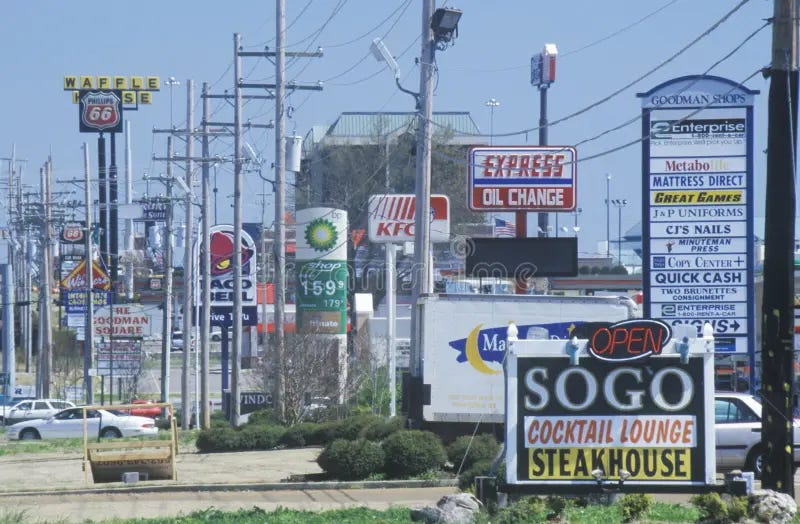
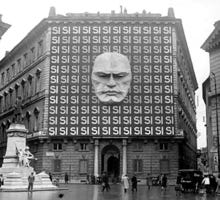
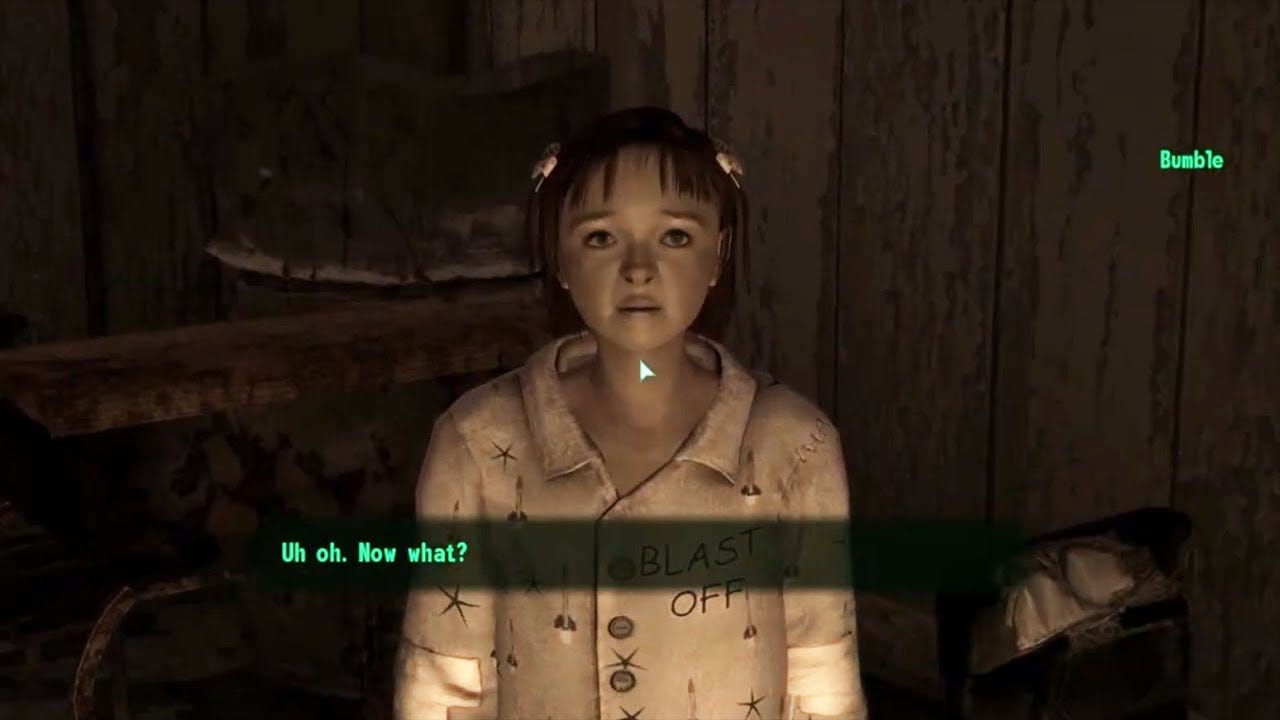
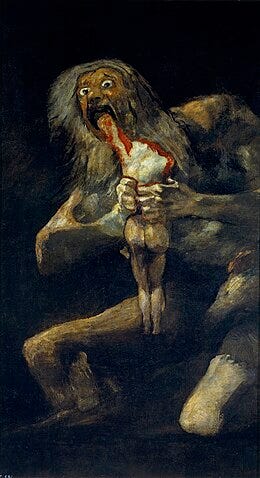
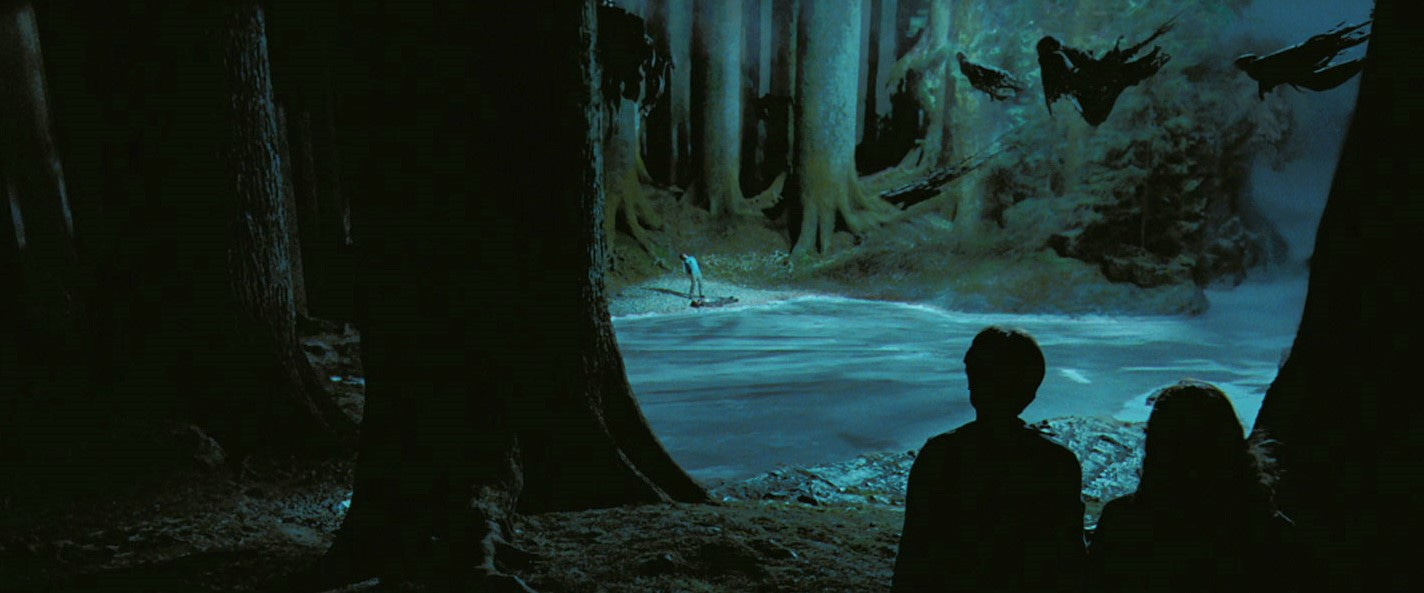

Agree with all three, adding brilliant and as true as words will allow
Fuck.